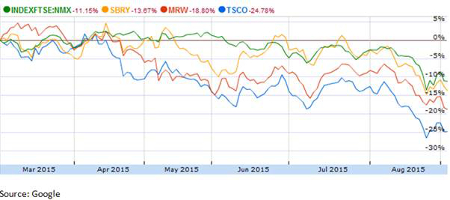Tesco, Sainsbury's and Morrisons suffer target cuts
2nd September 2015 13:37
by Lee Wild from interactive investor
Share on
Britain's battered supermarkets are back in focus. Half-year results begin rolling in from the three listed grocers in just eight days' time, and recent data suggests further grim reading. It's prompted number crunchers at JP Morgan to pen a 25-page missive packed with new forecasts and target prices.
Unfortunately for the food chains, the numbers are going down rather than up. Latest data from researcher Kantar implies worsening sales trends, and the macro outlook has deteriorated. Wages are rising, too, which will have an impact on margins. It's why JP Morgan has cut current year profit forecasts for Tesco, Sainsbury's and Morrisons.
"The acceleration of the discounters in the current upward economic cycle and ongoing market share losses of the Big 4 point to a rather structural threat for the industry, in our view," says the broker. "The UK currently has the worst of all combinations: top-line deflation combined with cost inflation (rents, wages, pension). The Big 4 currently suffer from negative operational leverage while the discounters are benefiting from clearly positive operational leverage (Aldi sales are growing by 25%, Lidl by c15%)."
is already the worst performing supermarket in terms of its share price, but its troubles are not over if JPM is right. A stretched balance sheet, structural challenges in the UK, lower overseas earnings visibility and demanding valuation mean the broker's forecast for operating profit in the year to February 2016 drops by 6% to £1.3 billion. Consensus numbers are likely to come down too. Even selling its Korea and Dunnhumby units for billions of pounds will be earnings dilutive.

(click to enlarge)
Ahead of interim results on 7 October, JPM remains 'underweight' and trims its price target from 175p to 160p. Credit Suisse is similarly unimpressed.
"Market share losses, which looked to be easing around the new year, are now reaccelerating," points out the Swiss broker. Indeed, Tesco last month recorded its worst year-on-year change since November 2014 compared with Aldi and Lidl which together reached an all-time high market share of 8.7%.
"Tesco's share price decline has merely tracked the market," says Credit Suisse. "We do not believe the operational issues we have been highlighting are priced in. Based on our revised DCF-based valuation, we reduce our target price from 169p to 155p and maintain our underperform rating."
Elsewhere, JPM takes the knife to estimates at , where first-half underlying operating profit is now tipped to slump from £423 million to £319 million, 4% less than its previous guess. Balance sheet concerns, high operational and financial leverage, a huge pension liability, and margin risk all count against it, and the broker remains 'underweight' with target price cut from 225p to 200p. A second-quarter update is out at the end of this month and interim results on 11 November.
kicks off results season on 10 September, but don't expect much.
Consensus estimates for 12-month underlying pre-tax profit has shrunk from £355 million to about £330 million over the past three months. JPM admits its own assumptions for both like-for-like growth and margins were too high, so now predicts a 27% slump in first-half profit to £158 million. However, it does expect management to reiterate its previous targets in terms of cost savings, working capital and property proceeds, which implies sticking with £1 billion of cost savings over the next three years. Chiefs should also repeat their 2015/16 dividend target of not less than 5p per share.
JPM lowers its target price from 225p to 200p, although the 'neutral' rating remains intact due to a better balance sheet, no pension liabilities, and management action. A "meaningful" discount to both Tesco and Sainsbury's also seems harsh.
This article is for information and discussion purposes only and does not form a recommendation to invest or otherwise. The value of an investment may fall. The investments referred to in this article may not be suitable for all investors, and if in doubt, an investor should seek advice from a qualified investment adviser.